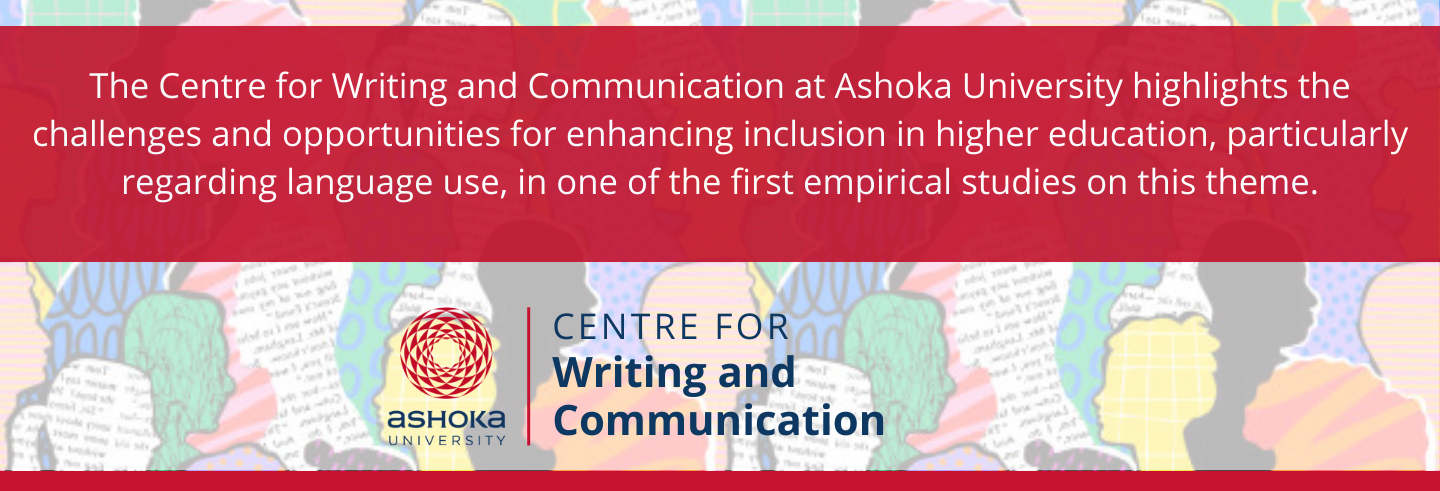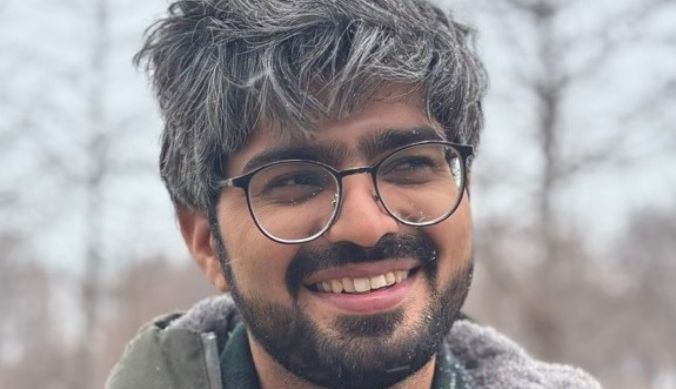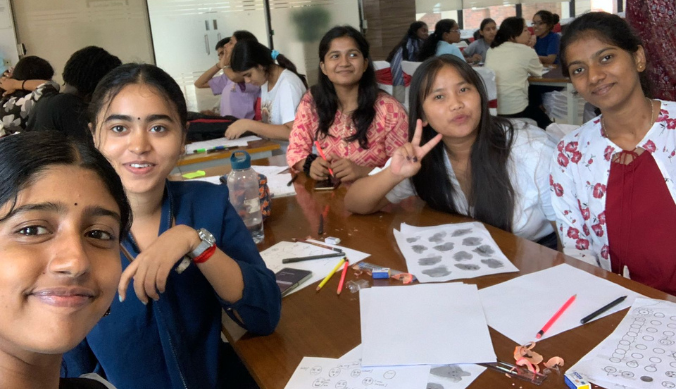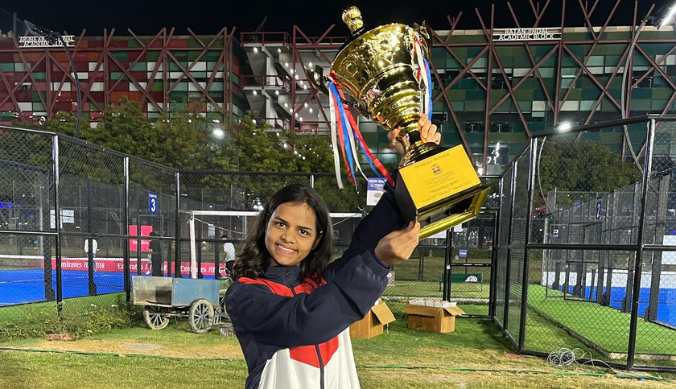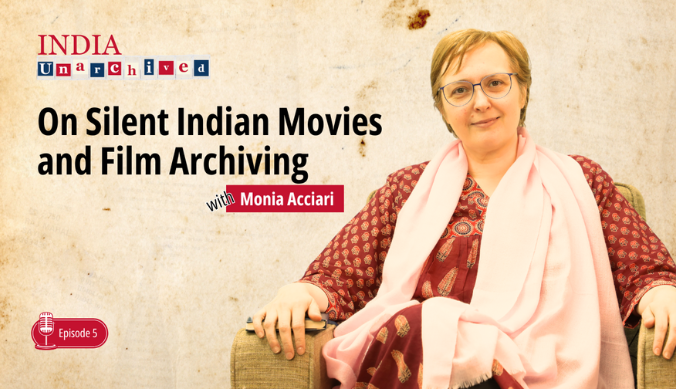Inclusion, Language and Pedagogy: Insights from CWC’s Study at Ashoka University
This research, led by Dr. Kanika Singh (CWC, Ashoka University) and Dr. Shivani Nag (School of Education Studies, Ambedkar University), highlights the challenges and opportunities for enhancing inclusion in higher education, particularly regarding language use
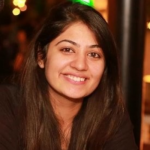
Yukti Arora
23 May, 2024 | 5m readThe Centre for Writing and Communication (CWC) at Ashoka University is a crucial hub for developing critical thinking, writing, and communication skills across the university community. CWC works with undergraduate and postgraduate students, research scholars, faculty, staff, and other specialized centres to ensure the development of an inclusive academic environment. The CWC team, a vibrant mix of scholars, writers, professionals, and researchers, actively contributes to Ashoka’s interdisciplinary engagement.
When the university was founded in 2014, CWC began as a smaller centre with a limited role, primarily offering one-on-one tutorials for an introductory writing course. Over time, CWC expanded into a multifaceted centre that is now involved in teaching, research, and outreach across different levels—undergraduate, postgraduate, and doctoral. The centre’s work involves teaching academic writing and communication, particularly supporting students who need help with English language skills. CWC also dedicates significant effort to developing learning materials to support teaching at Ashoka.
Through interactions with teachers and students at Ashoka, CWC found that teaching methods and the institutional mechanisms in the university could be exclusionary. Students frequently approached CWC seeking help to understand and engage with their academic work, including writing critically about assignment topics and presenting their ideas effectively. Those lacking English fluency faced significant challenges, as some were encountering basic language acquisition for the first time.
This significant gap was evident, as students’ (own) language and experiences were rarely acknowledged in formal or informal university communication. Many students struggled to participate in class and experienced social isolation. CWC recognized the need to respond and sought ways to develop pedagogical tools and practices tailored to these learners’ needs.
Initially, CWC tried providing more learning support through additional one-on-one tutorials, materials, and exercises. However, this approach created new problems for both CWC and the students, who were already at a disadvantage. The university lacked policies to accommodate these needs, and even though mechanisms were in place to partially support students, many did not take advantage of them. CWC questioned whether this indicated a rejection of its efforts toward inclusion.
These challenges posed a heavy burden on individual teachers, who struggled to support specific students or small groups. At the centre, mentors had to consider a variety of factors, including students’ backgrounds, university policies, curriculum offerings, and infrastructure support. These issues converged in CWC’s work and informed the following research project which examines inclusion, particularly through the lens of language, and aims to provide recommendations that support Ashoka’s pursuit of inclusive education. It seeks to move beyond merely providing access to education and instead focuses on facilitating meaningful academic participation.
Research Questions and Methodology
The study addressed five primary research questions:
- The academic challenges faced by students in different levels and disciplines, and the impact of using English as a medium of instruction.
- How language teaching and use at school and home during schooling years influenced students’ preparedness for academic engagement in an English-medium higher education context.
- Students’ reflections on the debates around the medium of instruction in higher education, with a focus on academic participation and future aspirations.
- Teachers’ understanding of students’ challenges and their perceived role in supporting students’ struggles with language, academic reading, and writing.
- What informs the teachers’ process of designing programmes; also teachers’ engagement with language in their teaching interactions with students at Ashoka.
Data were collected from two groups within the university: students and teachers. A survey was administered to students representing different programs and levels, followed by in-depth interviews with key informants. Teachers (at CWC and other departments) were also interviewed regarding their educational journey, views on language and pedagogy, and perceptions of students’ challenges. The project findings are based on the responses from 254 students (via questionnaires), and in-depth interviews with 25 students and 9 teachers at Ashoka.
Key Findings
Students’ Challenges:
1. The most frequently reported challenges faced by students (irrespective of their English language fluency) are participating in classroom discussion, reading assigned texts and academic writing.
2. Students, especially those from disadvantaged backgrounds, encountered challenges due to limited exposure to English and a lack of preparedness in school. Students expressed a desire for more time for readings and writing assignments and clearer guidance on academic tasks.
Teachers’ Perspectives:
1. Teachers emphasised the importance of university-wide conversations on inclusion and the necessity for greater awareness and support for students from lower socio-economic backgrounds.
2. The need for more collaboration between departments in the university and CWC.
Recommendations
Based on the findings, the study provided several recommendations to enhance inclusion in academic practices at Ashoka University:
Improved Classroom Practices: More care to be taken while assigning readings. Important for the teachers should provide more time for readings, offer guidance on how to approach texts, and facilitate classroom discussions focused on comprehension and diverse perspectives.
Enhanced Writing Support: The study suggests developing rubrics for feedback on writing tasks and offering more workshops on academic writing.
University-wide Initiatives: Encouraging multilingual classroom conversations, strengthening academic bridge programs, and supporting multilingual reading clubs could nurture a more inclusive academic environment.
Pedagogical Training: Teachers should receive training on sensitivity to context, language, and inclusion to better support students.
Relevance of this study:
- This is the first study of its kind within Ashoka which collects data of students and teachers across disciplines and levels on this theme. It helps identify patterns, challenges and common assumptions about the university’s academic experience.
- In the larger context of higher education in India, this is perhaps one of the first empirical studies on this theme. Most existing studies on language and pedagogy in the Indian context are with reference to school education.
- This study highlights the importance of writing centres in a university and the possibilities of their scope of work – to engage with questions of language, inclusion and academic work and their larger socio-political context.
The research project led by CWC sheds light on the challenges and opportunities for enhancing inclusion in higher education, especially in the context of language use. The recommendations provided aim to create a more supportive and inclusive academic experience for all students at Ashoka University.
Reference Report:
Language, Pedagogy and Inclusion in Higher Education: A Case Study of Ashoka University, Sonepat
PI: Dr. Kanika Singh, Director, Centre for Writing and Communication
Co-PI: Dr Shivani Nag, Assistant Professor, School of Education Studies, Ambedkar University, Delhi
Research Assistants:
Anasuith Pridhvish, M.A. English, Ashoka University
Ragalika Veeranala, B.Sc. Psychology, Ashoka University
The report is available in English & Hindi. This work was funded by the Office of Research and Development, Ashoka University.
Study at Ashoka







